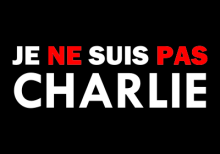
Following the events this past week in Paris, where 17 people died as a result of Muslim extremists attacking the leftist satirical newspaper Chalie Hebdo, I have been thinking quite a bit about how to react to it. I have watched people in the West react with shock and unbelief, I have seen the defiant reaction of cartoonists and journalists worldwide (although apparently not universally), the far right has gained momentum, radical Muslims have praised the actions of the attackers, I have seen moderate Muslims claim they denounce the attack, but lament that they themselves are in fact the real victims, and I have seen stories relating to bombings and massacres in Africa and the Middle East be largely ignored. While most of the West rushed to social media to pledge their support with #JeSuisCharlie ("I am Charlie"; including past and present Archbishops of Canterbury), I have been deeply uncomfortable with this.
Why did I feel uncomfortable? Because, due to the nature of the publication, I would not be a friend of Charlie Hebdo, and neither would they be of me. But surely, you would say, this is not a matter of personal relationships, but solidarity in tragedy (which is a universal human experience) and the protection of freedom of speech? Fair enough. Regarding the first point, what about everyone else across the world who lost their lives this week due to violence? To be quite frank, I have felt more remorse for the 10 year old girl who blew herself and 18 other people up in Nigeria this week. I do not know the full story, but I groan under what must have been the lies, threats and abuse that this little girl must have suffered to carry out this act. I consider her, the attacker, more of a victim than the adult Parisians who were living out their political ideology. What, then, about the second point about freedom of speech? Ah, yes. Freedom. Of speech. That certainly has been the hot topic of the week. Freedom of speech is Important and it must be Defended at all costs.
My purpose is not to write a deep philosophical dissertation about freedom. I recently made myself sit through a Crash Course on US History. While I did find many of the episodes to be incredibly boring, one—if not the—main themes of the series was not lost on me: what does "freedom" mean? The United States of America is the "land of the free", but it turns out that, throughout the centuries, this has meant different things to different people. Quite simply, freedom is such a broad term that, when it comes to the practical implementation of it, not everyone can agree on how to do it. This might seem strange to people who were brought up to believe that freedom is a "good thing", but was never exposed to the complexities and nuances behind it. A brief study into the matter will soon reveal this.
Freedom of speech is a good thing. I myself rely on it and if it were not for the protection of it by the Constitution of the Republic of South Africa, what I write on this very website could have been in jeopardy1. And so I do support free speech, even if I do not like what others say and even sometimes am hurt by it. But not the manner of Charlie Hebdo.
I remember a few years ago a friend shared a link to a music video of a Dutch musician. The video was really, extraordinarily bad. The singer also was clearly tone deaf. And with the song being in Dutch, I could understand most of the words, and it was cringeworthy. It was so bad that it was hilarious. I soon found more music videos by the same artist and they were equally horrendous. Believing the artist to either be purposefully comedic, or serious but simply talentless (I won't put anything past the Dutch), I eagerly reshared the music videos. I then soon found out, however, that the artist has a mental handicap. Suddenly, it was not funny any more. Suddenly, I felt bad. I had mocked something which was probably therapeutic and self-validating for someone who probably does not get much of it in this world apart from the music. Holding that person up to my preconceptions of what is good, worthy and acceptable was arrogant, prideful and degrading towards the artist. I had crossed a line.
So what does this all have to do with Charlie Hebdo? That paper is in the business of what is a pet peeve of mine: mockery and cheap jokes as a lazy substitute for sincere, meaningful and engaging discussion on serious topics. On a school yard, they would be the bully who breaks down the girl's self esteem by calling her fat. On the Internet chatrooms, they would be the one who, rather indifferently, tells some kid to go kill himself. They are all just words, right? They do not hurt. Not like the bullets of those killjoy terrorists. The reality is, though, that almost everywhere there is limitations on freedom of speech. In Germany, one cannot praise Hitler or deny the Holocaust. But those are just words, right? Words do not harm in and of themselves. It is taken for granted that people ignore "silly" words and make Right Decisions (like the 2 million Germans who democratically elected the Nazi party into power). But why limit ourselves to extreme examples on limitations on free speech? The Scottish police has declared that they "monitor" social media and will "investigate", lest anyone be offended.
At this point I still do not know exactly how to feel or react. The killings were wrong. Islam is not and should not be immune from criticism (if nothing else is). At the same time I am not a fan of the freedom of speech which Charlie Hebdo embraced. I again make an appeal (because I am a hopeless romantic) for respectful, sincere and honest discussion between people of different views and opinions. And I sincerely hope that such a thing is still possible. The impetus for me for actually writing this article was the title of an article by Stephen Fry. The article is entitled "You MUST mock". I was saddened by this title, as I generally expect more maturity from Fry than to encourage puerile behaviour. His article was not, though, an incitement to ridicule, but rather a general lament of the past week's events (and a jab at censorship attempts by the religious). However in light of this article (and, to be fair, many others which have been written this past week) I have to ask myself: in the contemporary marketplace of ideas, are religions still considered to be valid and have a voice for themselves? Or has it been summarily decided that religions cannot and should not be entertained? Surely one does not mock what one respects? I am not trying to make a special pleading for non-religious people to understand and sympathise with religious people: indeed, I know very well that the religious themselves also need to be more open and engaging (in constructive ways) with others.
Perhaps the lesson is that freedom (of any kind) is only possible if the maturity exists to not abuse it? Until everyone has reached that maturity, should the already mature be made to suffer in waiting?
- 1. Indeed, I am very much prepared for actually one day facing persecution for what I have and will continue to published on this website.







Comments
For a different perspective...
For a very different perspective, see Archbishop Cranmer's article, "Unbelievers and non-believers must be free to blaspheme with impunity". He factors in the basic fact that humans are fallen and will not always show respect.
Wisdom
James 3:6 comes to mind. The tongue. And the goal is to submit myself humbly before the Lord, and to act according to my believe in the Lord.
It is my perception you indicated in this article the above to be your conviction, and the uncaring, unloving use of words cannot be condoned, or excused, when a reaction in deeds follows - in this case extremely reactive.
If freedom of speech is the norm, the news we see follows. If respect of out Creator is the norm, love follows. Respect of the Creator presuppose faith. I saw respect being your approach to the topic. With most of your easy / uneasy feelings of this article, I agree, based on my conviction of our Creator's Word.